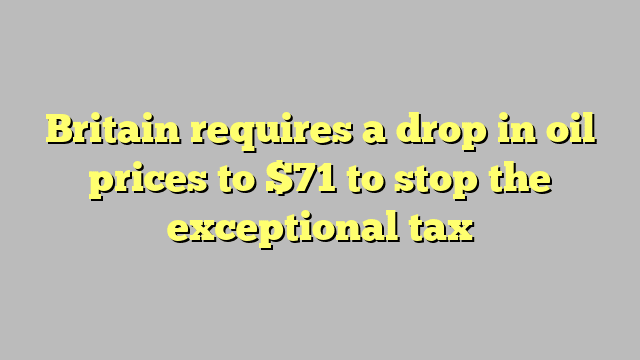Britain set a condition for falling oil prices in order to stop the exceptional profits tax it imposed last year, which angered a large number of international oil companies, and prompted others to liquidate their business in the North Sea or reduce their activities.
The British Finance Ministry said today, Friday, that the sudden British tax on oil and gas producers will not be applied if prices fall below certain levels for 6 consecutive months, in a move that the government hopes will enhance energy security.
The British government stressed that the UK will implement the Energy Security Investment Mechanism to “protect domestic energy supplies, and help protect some of the tens of thousands of sector-dependent jobs.”
The exceptional tax in Britain
The energy dividend tax was introduced in May last year after a jump in energy prices in the wake of Russia’s invasion of Ukraine, but the industry has warned that the higher tax level could lead to lower production in the long run.
Britain raised the income tax rate from 25% to 35% in November; This raised the total tax burden to 75%.
The Ministry of Finance said it has raised 2.8 billion pounds ($3.51 billion) so far, according to data seen by the specialized energy platform, quoting Reuters.
And she explained that the tax is scheduled to take effect until 2028, amid expectations that oil and gas prices will remain above normal rates, according to Bloomberg Agency.

Conditions for stopping work with the tax
The statement stressed that the exceptional tax on oil and gas production in the North Sea would be reduced to 40% from 75% when prices “continuously” return to normal levels for a sustainable period.
With Friday’s changes, the exceptional profits tax will decrease; This reduces the tax burden to 40% if average oil prices fall to $71.40 a barrel and £0.54 a gas therm ($0.68) or less for two consecutive quarters.
* Therm is equivalent to 100 thousand British thermal units.
The government said independent price projections by the Office for Budget Responsibility indicated that the floor price mechanism was unlikely to be triggered before the planned end date of the exceptional profits tax in March 2028.
Benchmark Brent crude prices have fallen from a March 2022 peak of $139 a barrel in the aftermath of Russia’s invasion of Ukraine to around $75 a barrel now, and have traded in a range of $70 to $89 a barrel so far this year.
Wholesale gas prices in Britain also rose in March 2022, to record increases of about 6 pounds ($ 7.53) for heat, but the benchmark British gas price for the front month is currently trading around 0.63 pounds ($ 0.79), according to Refinitiv Eikon data, and it was the last time Gas traded below £0.54 in April 2021.
Oil investments in Britain
Friday’s move comes ahead of a final investment decision by Norway’s Equinor in the $5 billion Rosebank oil field, which is earmarked for the first half.
Oil and gas producers in Britain’s North Sea, including Total Energy, said the tax would reduce investment in the basin.
“This is a step in the right direction, but we will have to do more to restore confidence in our sector,” said David Whitehouse, Chief Executive of Offshore Energy’s North Sea North Sea business association.
From producing about 4.4 million barrels of oil equivalent per day – at the beginning of the new millennium – Britain now produces about 1.3 million barrels of oil, and it is on its way to drop to less than 200,000 barrels of oil by 2050.

Leave a Reply